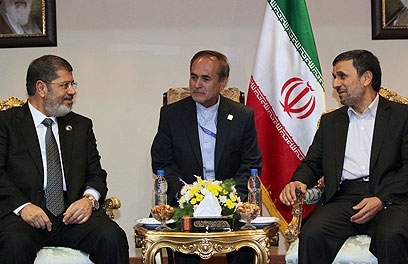 Mahmoud Ahmadinejad is a very busy man these days. He sends a monkey to space, if anyone believes that (and I, for one, do not), and then he is photographed near a new Iranian aircraft, billed as one of the most advanced in the world, which looks more like an advertising placard for Toys R' Us than anything real. In between he came to a visit defined as "historic" in Egypt. The term historic is attached too liberally to too many events just occurring in the Middle East, and this visit may be an interesting and intriguing event, but will be quickly forgotten and find itself in the dustbin of so many other "historic" events taking place in the region.
Mahmoud Ahmadinejad is a very busy man these days. He sends a monkey to space, if anyone believes that (and I, for one, do not), and then he is photographed near a new Iranian aircraft, billed as one of the most advanced in the world, which looks more like an advertising placard for Toys R' Us than anything real. In between he came to a visit defined as "historic" in Egypt. The term historic is attached too liberally to too many events just occurring in the Middle East, and this visit may be an interesting and intriguing event, but will be quickly forgotten and find itself in the dustbin of so many other "historic" events taking place in the region.This is not the great reconciliation meeting between the torch bearer of Shi'ite Islam, and the host of Al-Azhar, the greatest academy of Sunni Muslim scholarship in the world. This is not also the creation of a new anti-Israel axis based on two very important and populated countries such as Egypt and Iran are. In fact, the rhetoric in the halls of the Islamic conference in Cairo is clearly anti-Israel, but even that is not enough of a common denominator between these two countries. President Morsi of Egypt emphasized support to the Palestinians in a way that left no doubt as to where his sympathies lie, but did not go as far as threatening Israel's very existence. This was left to President Ahmadinejad, issuing the ritualistic threat to destroy Israel.
With all that happening, the Israeli Embassy in Cairo continues to be open, is functioning and so does the Egyptian Embassy in Tel-Aviv. Security cooperation between Israel and Egypt, particularly with regard to the Sinai and Gaza situation, continues unabated, and both Israelis and Egyptians know it full well; you can and need to work together even if there is no love lost existing, as it is about interests, not about sentiments. With regard to Iran, the Egyptians have very little interests in common, and even less so any commonality of sentiments.
Mohammad Morsi's most important challenge now is not to defend himself against the pressure of the opposition, as that is something that he can do relatively easily, surely so long as he can rely on the support of the armed forces. The real test for his authority is the fast deteriorating economic situation in Egypt. Not much is being said and written about that, but the writing is on the wall. Egypt is on the brink of a financial calamity, and in order to prevent it from happening, Egypt needs the international community, led by the US and the EU, which can prop the faltering Egyptian economy. Mahmoud Ahmadinejad, who presides over a crumbling economy of his own, can give Egypt nothing in that regard, save of an offer to help Egypt's nuclear energy project. A very dubious offer indeed. Morsi does not like Israel, and that is to put it as mildly as possible, but maintaining peace with Israel may prove to be his only hope for much-needed American and European help. In this context, it is President Obama's upcoming visit which is crucial to Egypt, not that show put off by Ahmadinejad.
Egypt needs the US, not Iran, and it is well known in DC. Hopefully, the Obama visit will be successful to the point when Morsi will be satisfied enough to get American assurances regarding his financial survivability, in return to assurances, on his part, regarding preserving the peace treaty with Israel. The Israelis, as well as their supporters in the US, are advised to keep cool in face of verbal Egyptian tirades. It is not pleasurable music, but an actual Egyptian renunciation of the peace will be far more disastrous. That is not going to happen, no matter what is the level and decibel of the saber rattling by Ahmadinejad, while in Cairo.
Then there is another insurmountable impediment to the creation of any real, viable Egyptian-Iranian axis. This is the Arab Spring, as these two countries are in opposite ends of the spectrum . Morsi and his newly-elected Muslim Brotherhood government are the products of the great upheaval. Ahmadinejad, his regime and dramatically so, his allies in Syria, are the forces which symbolize the very same political order that the the Morsis of the Middle East are against. The Iranian regime is placed on the wrong side of the current prevailing mood in the region. It is not about Israel and the conflict with the Palestinians, it is far more about the systematic slaughter of Sunnis in Syria. Sh'iite Iran and Sunni Egypt have nothing in common about this issue. The Syrian who threw the shoe at Ahmadinejad served notice to all involved as to who is now on the wrong side of history.
So, the prophet AMOS [AMOS 3;3] did not aim his famous line about the two who walk together at Egypt and Iran. No need to be unduly fooled by a media-oriented gimmick.
By Huffington Post
The Iran Project is not responsible for the content of quoted articles.











